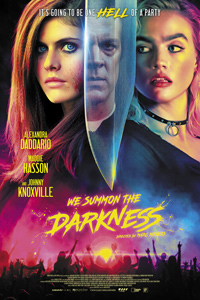Heaven and Earth: Meyers Tackles Organized Religion with Droll Thriller
 Director Marc Meyers returns to the isolating terrors of the rural Midwest in a different kind of period piece one might likely expect from him with We Summon the Darkness, a late-80s subversive genre film which some could mistake as a comedy-hybrid—but despite the hysterical zaniness of some of its characters, this is merely a superficial veneer of something much darker. A trio of starlets headline this jaunty return to the prevalent fears of the late 80s and early 90s, when satanic cults inspired collective mob mentalities into culturally ordained witch hunts (think the Paradise Lost documentary trilogy from Joe Berlinger and Bruce Sinofsky detailing the Robin Hood Hills murders). But Meyers isn’t interested in the supernatural elements of something like The Craft (1996) in an exercise which is much more terrestrial, the implications of which are amusing and troubling.
Director Marc Meyers returns to the isolating terrors of the rural Midwest in a different kind of period piece one might likely expect from him with We Summon the Darkness, a late-80s subversive genre film which some could mistake as a comedy-hybrid—but despite the hysterical zaniness of some of its characters, this is merely a superficial veneer of something much darker. A trio of starlets headline this jaunty return to the prevalent fears of the late 80s and early 90s, when satanic cults inspired collective mob mentalities into culturally ordained witch hunts (think the Paradise Lost documentary trilogy from Joe Berlinger and Bruce Sinofsky detailing the Robin Hood Hills murders). But Meyers isn’t interested in the supernatural elements of something like The Craft (1996) in an exercise which is much more terrestrial, the implications of which are amusing and troubling.
Indiana, 1988. Three best friends, including Alexis (Alexandra Daddario), Val (Maddie Hanson) and Bev (Amy Forsyth) are on a road trip to attend a heavy metal music festival. News transmissions on the radio and conversations with the locals point to a community on edge thanks to another killing which seems to be part of a violent spree courtesy of a satanic cult. Along the way, an altercation with three young men also attending the festival, including Mark (Keean Johnson), Kovacs (Logan Miller) and Ivan (Austin Swift), leads to an unexpected camaraderie between the two groups as the boys are invited to an after party at Alexis’ isolated home. And then, the darkness.
Atheists can perhaps rejoice about something like We Summon the Darkness which brazenly showcases the inherent cult-like mob mentality of any and all organized religions which allow for teachings and leaders to wield communal dissent, hatred, or any other generalized distrust of ‘others.’
That said, Alan Trezza’s script (who penned the last theatrical release, to date, for Joe Dante with 2014’s Burying the Ex) takes care to fashion each character into a distinctive personality, which allows for all its actors to shine, even those whose characters are relatively short-lived. Though he appears rather late in the game, Johnny Knoxville feels inspired as Pastor John Henry Butler and one wishes he had more screen time.
Although its intentions are in line with something like Meyers’ breakout film, 2017’s My Friend Dahmer, his latest is another intriguing change-of-pace from the director, especially considering its release hot on the heels of his social issue melodrama/remake Human Capital (read review). Fun, efficiently paced and subversive, the intention of We Summon the Darkness recalls the tagline of the 2004 horror film Hellbent stated, “When the night belongs to the devil, the party goes to hell.”
★★★½/☆☆☆☆☆


